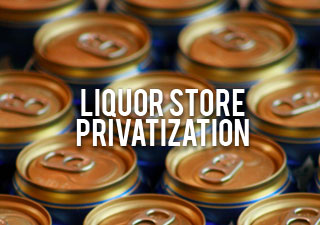Commentary

Bamboozled: Why Government-Run Liquor Stores are Socially and Economically Impractical
The privatization of Pennsylvania’s liquor stores is an idea that has been floating around the halls of Harrisburg for decades. The sale of stores alone would generate over $1.7 billion dollars in profit, while continuing to bring in close to $350 million a year through the alcohol sales tax. Ever since Pennsylvania seized control of wine and liquor in 1932, advocates of state-run liquor stores have touted the supposed social benefits. However, recent research clearly demonstrates that privatization would have little impact on social outcomes.
Defenders of the government-run liquor stores argue the state can directly regulate the time, location and quantity of liquor for purchase, thereby decreasing the overall consumption of alcohol. However, when looking at consumption rates in Iowa and West Virginia, two of the most recent states to move to licensing of retail liquor, Commonwealth Foundation scholars John Pulito and Antony Davies of Duquesne University found consumption actually decreased, by as much as 5.9%. One explanation is that with more convenient hours and less restrictive purchasing guidelines, consumers are buying less alcohol per trip.
Another main argument for full state control is that private retailers of alcohol tend to be less stringent with carding procedures, making the government more likely to discourage underage drinking. Thus, we should expect to see an average decrease in underage consumption when comparing state-controlled vs. license states, but the National Survey on Drug Use and Health shows no such correlation.
Many opponents of privatization also claim there would be an increase in alcohol-related driving fatalities without state regulation. Again, this hypothesis seems flawed, as the National Alcoholic Beverage Control Association (NABCA) reports that fully-controlled states have the highest average fatality rate. Even in terms of driving under the influence, the NABCA shows that those states with the highest degree of government control also have highest DUI arrest rate.
The economic benefit of privatizing Pennsylvania’s wine and spirit stores is immense. Just the sale of retail and wholesale outlets alone would generate a substantial windfall, just as state revenue collections are falling short of estimate. Aside from filling the deficit, Pennsylvanians would benefit from better customer service and lower prices on their favorite beverages. While the PA Liquor Control Board claims to provide “the lowest possible prices” in its marketing, the Commonwealth Foundation analyzed prices of popular alcoholic beverages at the local state store and compared them to the prices found on BevMo.com, a leading Internet retailer that only ships to its home license states of Arizona and California.
Price Comparison: PA Liquor Control Board vs. BevMo.com
|
Wine/Spirit/Liquor |
Size |
BevMo.com Regular Price |
BevMo.com ClubBev Price |
PLCB Price |
PLCB Markup |
|
Belvedere Vodka |
750mL |
$29.99 |
$24.99 |
$30.99 |
3.3-24% |
|
Bombay Sapphire Gin |
750mL |
$31.99 |
$27.99 |
$38.99 |
21.8-39.2% |
|
Patron Silver Tequila |
750mL |
$43.98 |
$39.98 |
$47.99 |
9.1-20% |
|
Frog’s Leap Merlot |
750mL |
$32.99 |
$29.99 |
$44.99 |
36.3-50% |
|
Keenan Chardonnay |
750mL |
$26.99 |
$24.99 |
$28.99 |
7.4-16% |
If customers choose to sign up for their Club Bev card, they can save even more, a promotion one is unlikely to find in the government liquor monopoly. As demonstrated in the table below, consumers are forced to pay up to 50% more at Pennsylvania Wine and Spirit stores than BevMo.com.
By charging notably higher prices, Pennsylvania is incentivizing potential customers to purchase liquor in neighboring states. As any college student within driving distance of the state border can attest (my own experience at Temple University included), many potential customers simply take advantage of lower prices in other states, even at the risk of hefty fines for transporting alcohol across state lines.
Now is the time to end Pennsylvania’s government monopoly over this lucrative industry. The revenue generated by competition would alleviate the short- and long-term fiscal woes of the Commonwealth. And the much-touted social arguments against privatization prove unfounded under rigorous research, leaving little reason for burdensome purchasing regulations and over-priced alcohol.
# # #
Michael J. Nerozzi is a Research Associate with the Commonwealth Foundation, www.CommonwealthFoundation.org, an independent, nonprofit public policy research and educational institute based in Harrisburg.